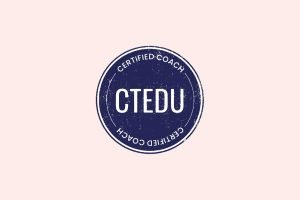Last updated on July 16, 2024
If you’re considering a career as a life coach, you may wonder whether obtaining a certificate is a prerequisite before taking on clients. Do you need a certification to be a life coach, or is that a waste of your time and money?
This one step holds significant weight in shaping your career path, so in this article, we’ll solve the dilemma once and for all. We’ll address all the crucial questions regarding coach training, including whether certification is really necessary, the pros and cons of getting certified, as well as affordable ways to earn a certification.
Table of Contents
Do You Need a Certificate to Be a Life Coach?
The simple truth is that you don’t need a certification to become a life coach. Coaching is an unregulated industry, so there are no formal or mandatory requirements for establishing a coaching practice.
However, it’s important to note that 81.3% of coaches do have a coaching certification. So, why do so many coaches opt for certification even though it’s not required?
Certification programs provide a streamlined and structured learning path and contain a plethora of knowledge, insights, and tools shared by leading experts in the industry. Not only that but certification from a reputable organization shows clients that you have gone through training and that you meet high standards in coaching. We’ll share more on the benefits later.
Do You Need a Degree To Be a Life Coach?
You don’t need to have a degree to be a life coach. Even though 55% of life coaches hold a bachelor’s degree and 21% have a master’s degree, you can become a life coach without any formal education. What’s important in this field are specialized training, certification, and relevant experience.
What Training Do You Need To Be a Life Coach?
Training for the life coaching profession typically comes in the form of certification programs. These programs can last anywhere from a couple of days to over a year, depending on the field and how comprehensive the curriculum is.
There are training programs for every coaching niche—including health coach, relationship coach, career coach, spiritual life coach, and more—which allows you to specialize in the field that interests you.

Through training, you work with coaching experts who help you get a deeper understanding of the matter and develop the skills needed for successful coaching. Some of the key traits of life coaches include:
- Communication skills
- Active listening skills
- Empathy
- Patience
- Ability to motivate and encourage
- Problem-solving skills
Pros and Cons of Earning a Life Coach Certification
Let’s uncover the benefits of life coach certification programs and look at the potential drawbacks.
Pros
- Save time and effort — Coach training might appear time-consuming, but enrolling in a certification program actually saves you valuable time. You’ll receive all the industry insights, tips, and tricks in one package. On top of that, you’ll be guided by experienced coaches who already know what works, which will spare you from research and trial and error.
- Hone coaching skills – Even if you’re already proficient in a specific field, there is more to coaching than passing on knowledge. As the name suggests, you need to be able to effectively coach clients. Coaching programs can equip you with the necessary abilities to guide clients successfully.
- Build trust among clients – Clients will feel more comfortable putting their mental and physical health in the hands of someone who has proof of their expertise. With certification, you’ll inspire greater confidence in your abilities and entice clients to choose you over competitors.

- Boost your credibility – Formal credentials validate your expert status and help you establish yourself as a professional. This doesn’t just refer to clients, but also to your status among fellow coaches.
- Networking opportunities – Through certification programs, you have a chance to meet like-minded individuals and connect with other coaches in the field. Networking can open doors to collaborations, new insights, potential work opportunities, and more.
- Increased confidence – Knowing that you have received formal training in the industry as well as honed all the necessary skills will provide a sense of assurance and empower you to approach clients with self-confidence and credibility.
Cons
- Costly investment – Certification programs can be quite expensive, reaching over $10,000 or more. But the beauty of a great variety of coach training is that you can find programs that suit your budget.
- Lack of flexibility – Certain certification programs have rigid schedules, either in the form of in-person classes or online sessions. If you have limited flexibility or time due to personal and professional responsibilities, your choices may be limited. However, there are many self-paced programs that are suitable for everyone.
- Mismatched pairing – Not every program will align with your viewpoints, coaching style, and goals. So, if you don’t make the right choice, you can waste your time and money. That’s why thorough research of the program, instructors, and their approach to coaching is crucial before signing up.
If you decide to launch a coaching business without getting certified, be sure to check out our article on becoming a life coach without certification.
Affordable Ways To Get Certified
The sky-high certification fees shouldn’t discourage you from going after a certification. There are many affordable certification programs that allow you to obtain the credentials without breaking the bank.

Here are some of the best budget-friendly coach training courses which you can learn more about in this best affordable life coach certification programs post:
- Transformation Academy (read our review on Transformation Academy for more information)
- Achology
- Life Coach Training Institute
- Udemy (find out about our top picks for Udemy life coach certifications in this review)
- Universal Coach Institute
FAQs
- How much do life coaches make?
According to iPEC, the average life coach salary ranges from approximately $62,500 per year to $245,000 per year, depending on your level of experience, client list, location, reputation, and many other factors.
- How much does a life coach certification cost?
Certification program costs can vary significantly, and they span from $100 to over $20,000. The majority of comprehensive programs fall within the $2,000 to $4,000 range, but there are also more affordable alternatives.
- Does accreditation matter in a life coach certification program?
Choosing an accredited program ensures you invest in a quality education that follows industry best practices, giving you peace of mind—but accreditation isn’t required. The most well-known accrediting body is the International Coaching Federation (ICF).
- What is the most recognized coaching certification?
For broader recognition, focus on accreditation rather than the program’s name. For example, Coach Training Alliance offers globally recognized ICF accreditation which is known and respected by clients and fellow coaches alike.
Conclusion
Life coach requirements are minimal (better said, non-existent), but that doesn’t mean that you shouldn’t go after certification and achieve your full coaching potential. While certification isn’t required, it is highly useful for building credibility, expanding your client list, and honing skills for a successful coaching career.
With budget-friendly and self-paced courses such as Transformation Academy, there’s no reason not to validate your expertise through a certification program. If you’ve made the decision to enroll in a coach training program, our list of the best life coach certifications can narrow down your choices. There, we discuss many sought-after programs such as Coach Training Alliance, iPEC, The Life Coach School, and more.
Take the Coach Certification Quiz
Need help choosing a coach training and certification program? We created this short quiz to help you find the best program for you.
Take the quizThe Life Coach Magazine staff is your team for high-quality content on topics from personal development, to coaching tips, to how to grow your coaching business.

















Be First to Comment